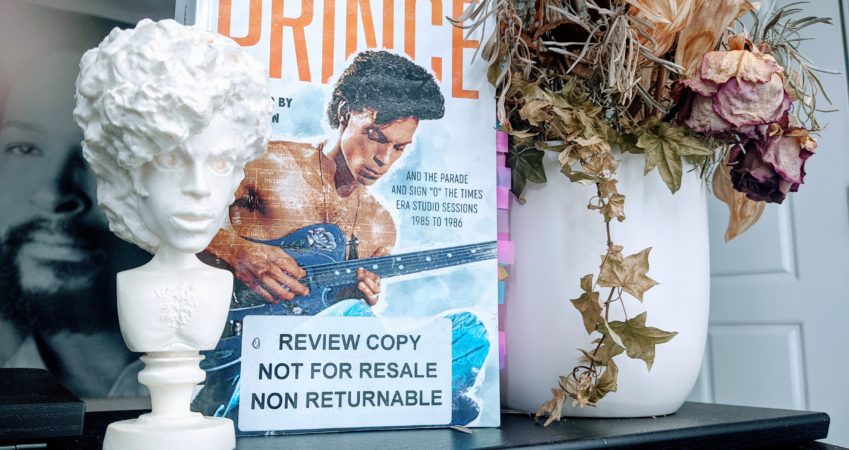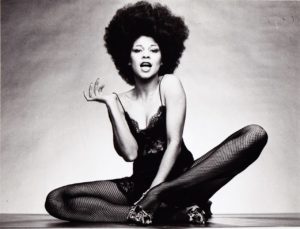
Let me tell you what I wish I’d known
When I was young and dreamed of glory
You have no control
Who lives, who dies, who tells your story
How do you capture the essence of a time that occurred 30 years ago? Especially when the thoughts and feelings of the artist can only be gleaned from interviews, articles, or notes from the subject themselves? If the subject is not available, the story will be told from the perspective of accessible people who were around during that time.
Prince and the Parade and Sign of the Times Era Studio Session 1985 to 1986, is largely the story of Prince’s creative period told by members of The Revolution, associates, and studio staff. It’s really important to keep in mind that these accounts are from the perspective of these collaborators who are recalling memories of being in their 20’s while riding the comet of the artist known as Prince. Their thoughts about Prince’s motivations, his influences, his drive, are also their truths according to how they are able to understand and reflect upon what they experienced.
For me, this book is more about the stories of the band and his collaborators largely because the only person who can truly to speak to what was in his mind, his reasons for his decisions, or his motivations….is Prince.
“It was one of the first times where he asked me to just come in on my own. He wasn’t there. And it was late at night. In fact, it was at the warehouse in Edina, and it was just Susan and myself. I came in and I hadn’t written anything, because I hadn’t heard the song. Just came in and did an extemporaneous thing on it.” – Eric Leeds
“The album bounced around creatively, but David Z and Jill had a lot of latitude when it came to their sound, according to Jones. “I think Prince also trusted me to go my way, because once Miles Davis actually gave it the stamp of approval. We played it for him, and it kind of was finished once Miles heard it, technically. Prince told me ‘Miles loves you. He just loves you.’”
“I think what I can say with any kind of conviction is that we did have really decent quality control,” explains Wendy. “We had really good taste and I think he knew that. Me, Lisa, Susannah, Roy Bennett, and Eric Leeds. I think he relied on those people for more than just music, but also a sense of aesthetic in his world. And that aesthetic was super high quality.”
Sometimes he’d come back with a girl because he’d meet a pretty girl at First Avenue. And he’d come back to the studio with a girl, and he’d be like, “Sit here baby. I’ve just got to work on this song a little bit.” And “baby” would sit there for hours until she would get tired and go home. The magnetic pull of music for him was greater than his relationship with any woman I ever saw. And even the one I saw the most of was with Susannah and nothing came between him and his music and his love of recording, which is why I spent so much time with him. – Susan Rogers
If you keep up with me on social media, you know I’m big about saying…and believing… “you see what you see based on how you see”. I also generally take issue with anything that presents itself as a text of truth about Prince based on information “from those who knew him best” exactly for this reason. As Prince would say, “you only know what you know…you only see what your heart will show”. He was notorious about presenting himself based on how he wanted you to see him…and this book is a masterclass in what happens as a result.
I interview every soldier who fought by your side
I try to make sense of your thousands of pages of writings
You really do write like you’re running out of time
“I was around him all the time, but I can’t say that I knew him that well, because my function wasn’t to know him on a personal level.” – Susan Rogers
This book offers a lot of personal takes on Prince’s motivations, thoughts, feelings, again a kind of Rorschach test for those offering their insights. Because of what I am bringing to the experience of reading this, I found it hard to sit through personal takes on Prince’s motivations as told by people who largely did not come from the culture I was raised in and thus lacked the nuance to place things in proper context.
“Prince wasn’t really good at communicating his thoughts and words and emotions, I think because he’s such a guarded person. So he’d hide it by being a jokester and kind of making people feel bad and intimidating and being kind of childish. That was his way of talking to people. And he wanted to have control, I guess he was maybe afraid of being taken advantage of or hurt.” – Norbert Stachel
“I think that Under The Cherry Moon was catered toward a white audience, talking about rich people in the south of France, and the lead actress was white and I think that, if you look at Sign O The Times, he tried to deliberately write a song about urban issues.”- Susan Rogers
“There was a certain, I think …maybe envy…maybe, in the far end of the spectrum, jealousy that Morris [Day] and Jerome’s repartee in Purple Rain was so successful. And that maybe, in response, his relationship with Jerome in Cherry Moon was trying to match that repartee, and it failed.” – Wendy Melvoin
I should note that Duane did challenge this take in the text to point out that Morris Day WAS Prince and he also backed this up with an anecdote from Jerome Benton about the bat scene being a real life event they went through as a testament to Prince’s authenticity in UTCM.
Another moment that stood out was a reference to Betty Davis in this referenced quote from Vibe magazine :
According to Lisa, Prince was specific about what he wanted for their vocals. “Prince would tell us when we would be doing background vocals, ‘Sing like you are Betty Davis.’ If we weren’t in the studio, we would watch old black and white films from that whole ‘Puttin’ On The Ritz’ era.”
Did he mean Betty Davis (ex wife of Miles Davis and an amazing funk singer in her own right)?

Or
Bette Davis an actual star of All Star Revue’s Putting on the Ritz?

The absence of Black nuance is understandable given the main contributors of this book not being from that culture. You can only tell the story based on the information that is told to you by the people who were there and they can only know certain things about Prince according to what he was willing to include them in. Looking to others to write that story someday!
I put myself back in the narrative
I stop wasting time on tears
I live another 50 years
It’s not enough
This book helped me to understand more about the “shadow work” of those who put in time with Prince. While we are all aware that everyone put in extraordinary hours to support his vision, it sometimes seemed…difficult because most of their contributions were ultimately not released.
“There was tons of stuff that he was just doing on his own, I mean, he was just living in the studio. And there was a lot of other stuff that Wendy and Lisa were working with him on, too. A lot of which didn’t see the light of day. It was absolutely ridiculous.” – Eric Leeds
Notably, there would be commentary about Wendy and Lisa contributing considerable effort to overseeing or adding to countless songs, most of which remain unreleased or their contributions removed from final versions as noted at the end of the session notes. That is understandably frustrating and they should receive some recognition for the work they were putting in that many people didn’t know about! It gives some context into how and why they speak about their experiences the way they do now.
I rely on Angelica
While she’s alive, we tell your story
When I needed her most, she was right on time
And I’m still not through
We hear about his romantically linked female collaborators such as Devin DeVasquez, Jill Jones, Sheila E, and Susannah Melvoin who also appeared in the Purple Rain Studio sessions book, but unfortunately Maneca Lightner, covergirl of the Madhouse albums first released in January 87 is absent. It would have been interesting to hear more from folks who were not part of the more well known cast of characters to provide a bit more nuance, especially from the perspective of a Black person who was a bit outside of the main bubble, but still intimately involved with Prince. Perhaps Maneca might have a story to tell in the 87-88 book? *Wink
And when my time is up
Have I done enough?
Will they tell your story?
A TREMENDOUS amount of work went in to compiling this collection of information about this pivotal time of Prince’s career. Between interviews with people who were there, combing through articles, books, studio records…literally decades worth of information to try to piece together went on during this time is quite a daunting task!
To get the stories of those who were there down on paper is important work. Their perspectives on their time with Prince should be part of historical record as their memories, thoughts and experiences are their truth. Prince and the Parade and Sign of the Times Era Studio Session 1985 to 1986 is an important artifact that captures how it felt to be part of that journey…the good, the bad, and the ugly. If you come to this book with a bias against those who were included, it may prove to be a difficult read, but how YOU personally feel about the journeys of the people who were there…is a personal journey for you to grapple with as well.
And when you’re gone, who remembers your name?
Who keeps your flame?
Who tells your story?
– Lin-Manuel Miranda


Joan Bennett was the star of Puttin’ on the ritz.
Sorry I should have clarified I meant the All Star Revue production.
I agree with your premise that Prince is whitewashed time and time again. You see it constantly in reference to the Revolution and their contributions to his work.
I feel like at this point the story is so strong in their favor for so long, people are not aware of other narratives. Things are slowly starting to come out as people become more willing to talk from the 80’s. Lots more from Jerome, Maneca, Jill, Jesse Johnson, Jimmy Jam, Terry Lewis and others since P ducked out, but it’s been via virtual events, in person events, podcasts, and Clubhouse which are harder to document for the record. Morris just did a Questlove podcast as well. Then of course we have Mark and Morris’s books now too…and Dez’s book came out before Prince left us.
Just need more of them to be willing to get their memories down on paper. Who knows if that’s in progress for more of them though. Doing that and having their work referenced in other scholarly work will help to build alternative narratives I think.